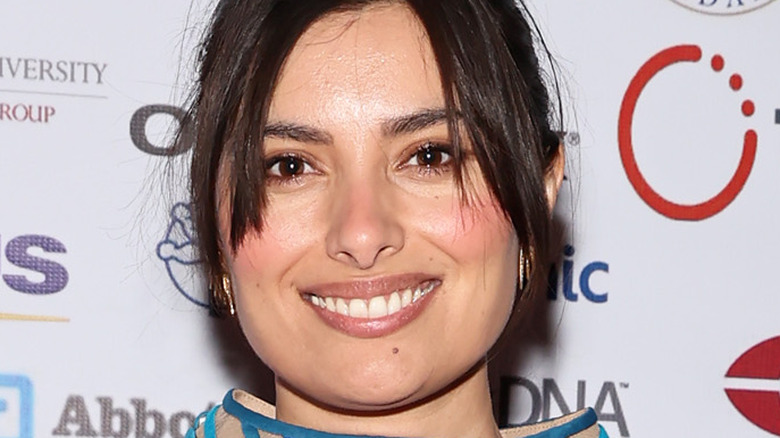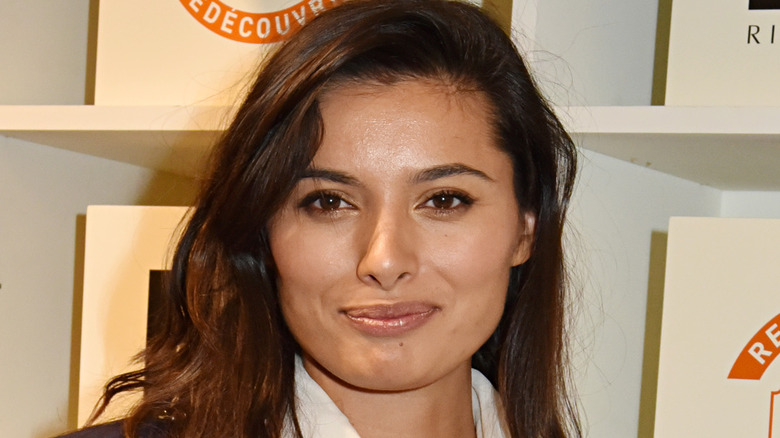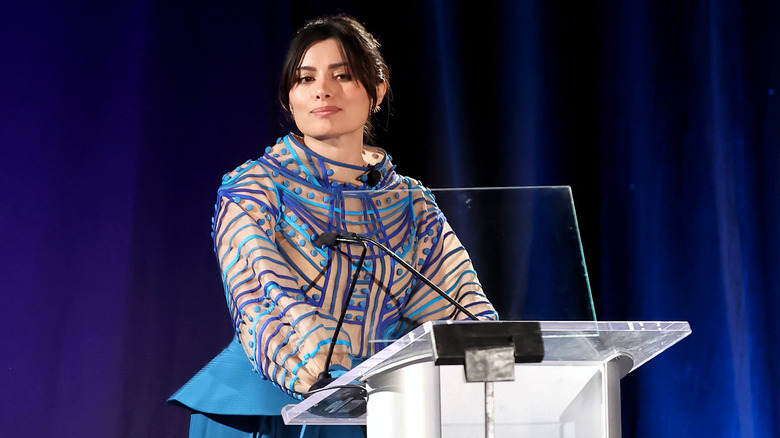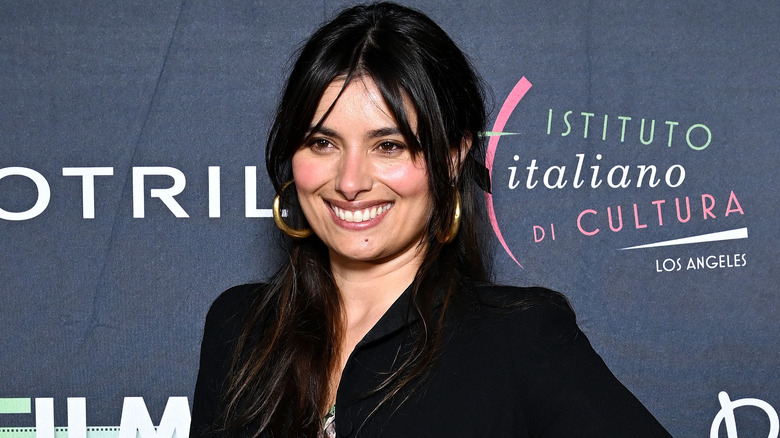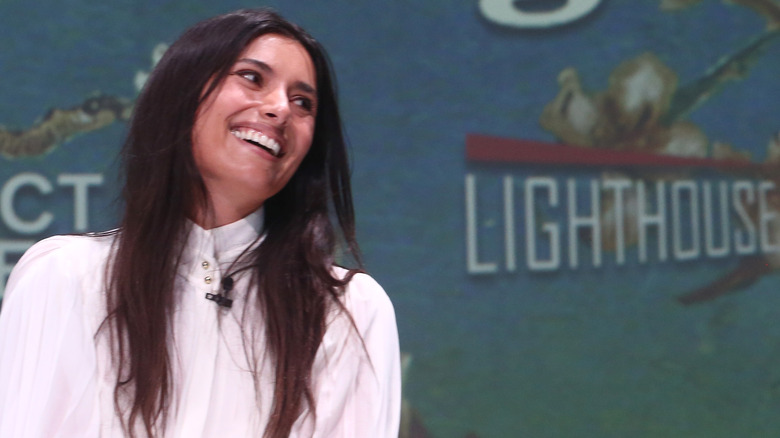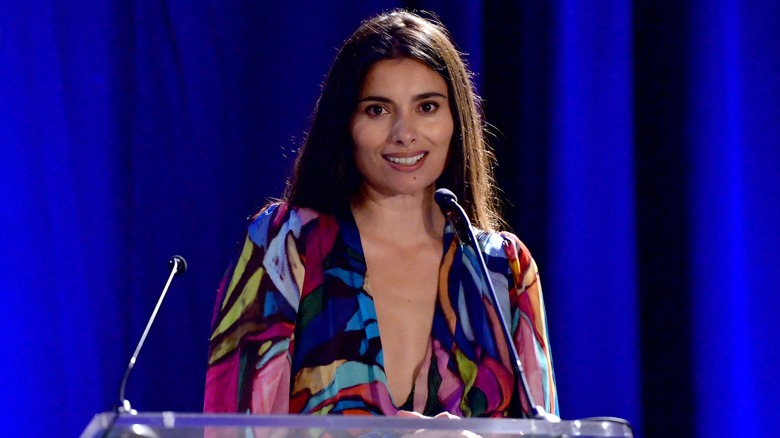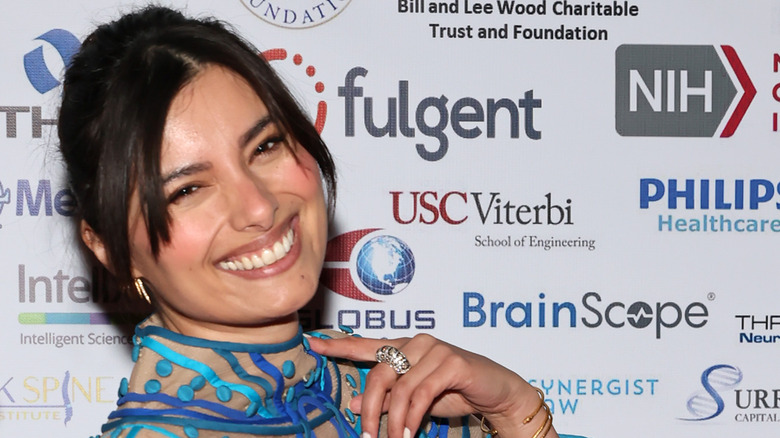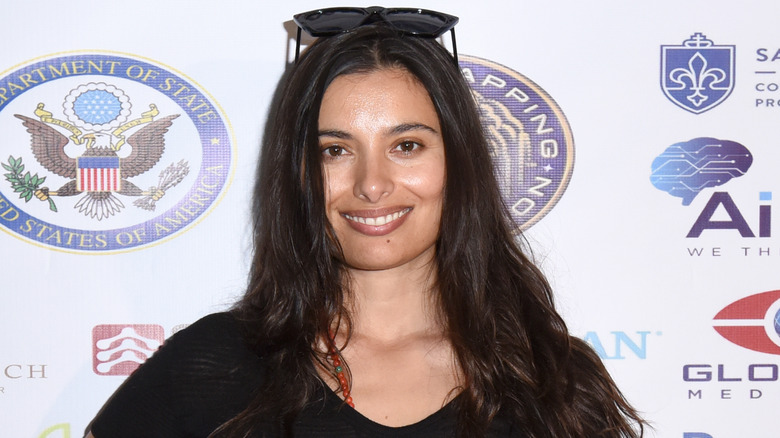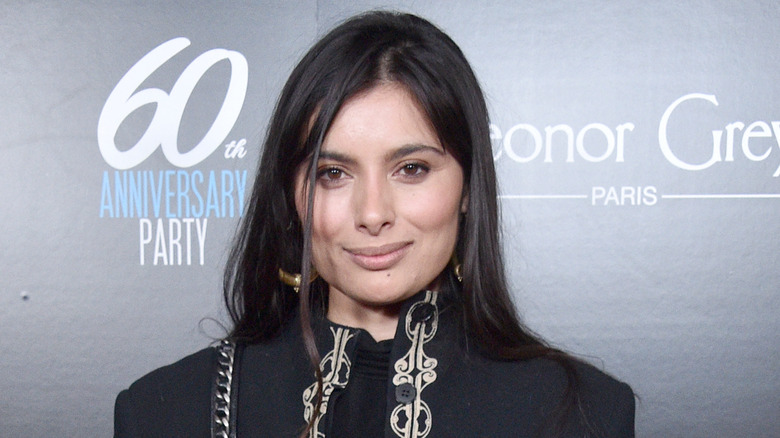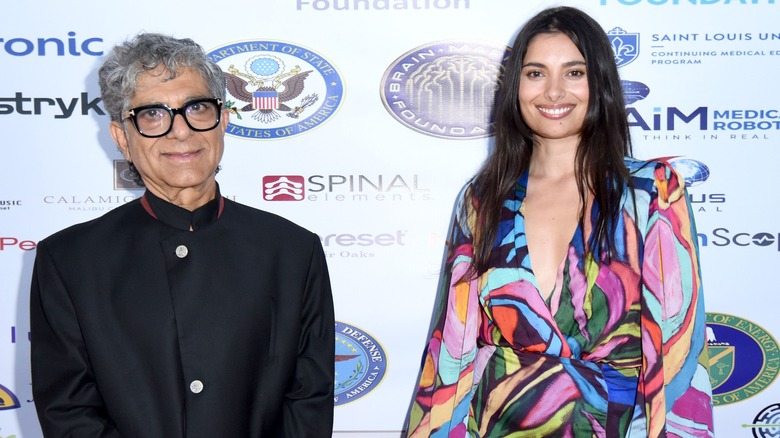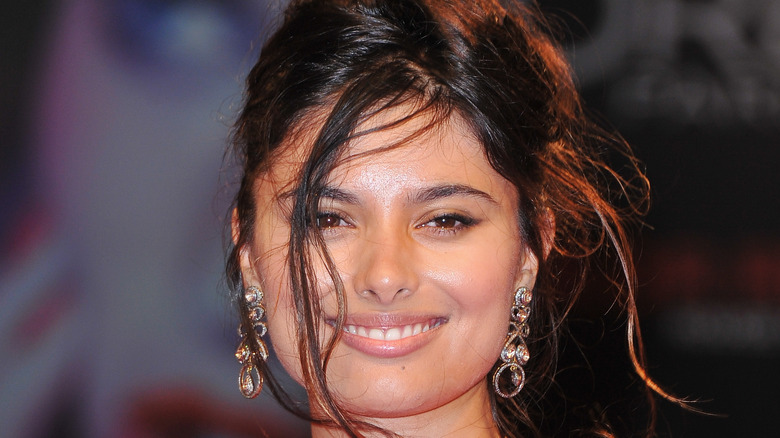Actress And Activist Gabriella Wright On Mental Health And Finding The Path To Joy – Exclusive Interview
Actress, activist, and humanitarian powerhouse Gabriella Wright has an incredibly peaceful presence and decades of experience in cultivating it. From her years spent studying Tibetan Buddhism to her meditation practice, from motherhood to cofounding Never Alone, Wright is a woman on a mission, albeit a tranquil one.
Never Alone, which Wright co-founded with none other than Deepak Chopra, is a humanitarian effort unlike those that have come before. Chopra and Wright are working synergistically to develop a global platform to provide mental health resources to those seeking aid while also expanding the conversations surrounding mental health and tearing down harmful stigmas. So while Never Alone is a suicide prevention initiative, it also offers resources for those who are moving through the stages of grief, and can provide insight for anyone looking to structure their life around joy.
We were lucky enough to sit down with Wright to discuss much of the nuance behind what drives her daily life. She has spoken openly about her personally vested interest in mental health awareness since her sister died by suicide in 2018. Her ability to seemingly transcend the struggles of the human existence is nothing short of extraordinary, especially considering that she does so with immense grace, multiple career paths, and as a single mother.
If you or anyone you know is having suicidal thoughts, please call the National Suicide Prevention Lifeline at 1-800-273-TALK (8255).
Never Alone is a wide-reaching "love story"
The first thing I really wanted to talk about is your social initiative, Never Alone. Can you tell me a little bit about this please?
Yes. So, Never Alone, I always say it's a love story and people are like, "What are you talking about?" And the thing is, it's a love story between the living. I would say the people who are here and those who have departed — those who have departed through, I would say, the tragedy of mental illness, the tragedy of the unseen of one's mental wellbeing, and the blind spot in our collective society and also in our families. So, when I say it's a love story, it's because it hits personal.
Almost four years ago now, my little sister died by suicide and, of course, like every loss, when it's close to home becomes a very personal experience. And when it becomes very personal, you realize that, "Oh my goodness, there are so many people like this. There are so many people who are experiencing the same grief that I am, and who do not have the means to overcome that."
So, Never Alone is a mental wellbeing, suicide prevention initiative on the path to joy. I like adding the last aspect because now we are really trying to look at it from a big picture. Like, yes, there's grief. Yes, there's prevention — suicide prevention — but what do we do once we have the tools to navigate the space, whether we've lost someone, whether we are dealing with mental unease, whether it's a fellow family member, but then where do we go from there? And how can we truly liberate from suffering [and get] to the path to joy and contribute to a wonderful transformative humanity, because we all matter? So, that's how. That's the how and the intention.
How the pandemic changed some of the rhetoric surrounding mental health
Beautiful. So, what have been some of the bigger obstacles that you faced in working with this? And then, I think, working to unravel the stigma surrounding mental health?
Well, that's exactly the problem. You described it so well. There are obstacles ... especially prior [to the] pandemic. Prior-pandemic, it [was] very like, "Oh yes, it's invisible." You would see an occasional artist in the news die by suicide, Robin Williams, for example, this musician Avicii, all of these things. But there was no aggregation around it ... Just for information, I read a paper the other day, and mental health is the sector that [has] a lack of grant accessing, basically. Grants are not being given health initiatives.
It's not that they're not being given. It just is not enough. And it's a sector that's been under-seen, under-viewed, under-appreciated, quote unquote, because [it's] invisible. We're not giving humanitarian aid. We're not bringing clothes and water and all of this. It's an invisible aid. And that is very hard to quantify as well. So, that's been an obstacle, quantification. [There is also] stigma — but thanks to the pandemic, thanks to, I'd say, the common denominator of where we all stood in isolation and realizing that, "Oh my goodness, we are alone." And we don't want to feel alone. And we're dealing with whether it's mental hygiene, mental space, self-awareness. So, thanks to the pandemic, there was a better recognition of the problem that was always there. So, this is where we're at now. Thanks to the pandemic, it's given more light to this, generally.
So, that's a good thing, but we've also understood that mental health is not a universal point. It's not a universal, one-size-fits-all. So, depending on one's culture, one's religion, one's geography, one's history, mental health is regarded and spoken about in a different way. So, we have to also adapt ourselves to different territories. And that is a huge amount of work. And that can be seen as an obstacle as well.
What is mental hygiene?
What types of mental hygiene tools have you found the most valuable for people who you work with, and for yourself?
Several things, several things. So, when I speak about mental hygiene, just to give it a bit of context ... mental hygiene is a way to start creating [a] relationship with your mind so that you can observe the fluctuations of where you're at. So for example, we have physical hygiene, you have dental hygiene. You know, if you don't brush your teeth, you basically get a filling and that can be painful for a second, and you have to have an intervention. So, when you have mental hygiene, these are tools that allow you to create self-awareness for your mental wellbeing. So, that means that when you have this tool, this power of self-assessment, and when you feel that you do need an intervention — when you do need, maybe, to see a specialist in a different sector — you will be guided to the right areas because you will know what you need.
Because a lot of people do not know what we need, that's why mental hygiene is a distinction that allows you to separate, connect, step back, and say, "Oh yeah, is this recurring? Or is this not? How is it making me feel right now? Is this going to fluctuate? Or am I going to feel better after?" So, it's all of these tools of self-awareness. And so they come in many different ways.
One thing that is so simple, so simple, but [I do] whenever I feel completely overwhelmed — and there's a lot of people [who it could benefit], especially teammates or people around me or women, single mothers with our children over the pandemic — [is to] just stop. ... Literally, just stop. It's the stop technique. Literally, you just stop. And so everything going on, you start breathing through your nose and you exhale everything that you want to say, but you're not going to say it. And you are exhaling it with this powerful exhale. You can go to the kitchen while putting the tap on. Literally, like "Leave me alone, I'm in my space. I might not have my physical space, but I have my space." And you are just tuning in to the sensation of your body because your body is the map of your mind. And we forget that. So, every tension is a symbol of what's happening in the mind. And if it's recurring, then we haven't paid attention. So, we haven't stopped.
How the "stop technique" can yield life-changing results
CONTINUED: There are breathing techniques. If you're feeling really too overwhelmed [by] anything — any relationship, any argument, any global turbulence — you could breathe in through your nose and just exhale as if it's a black cloud, just gray matter leaving you. These are tantric, actually, practices from Vajrasana, but when they are put down so simply in our daily lives, they may seem like nothing, but they make a huge difference.
Another thing is water. For example, water is connected to the element of our emotions. So, emotional turbulence is generally the first thing that triggers mental unease because it's overwhelming. So water, same thing — under the shower, first thing in the morning, I release everything that I had during the night. ... You're under the shower and you are just seeing that leave your body, and you tune into your body and you start feeling the water element.
Even if you can't feel it, your intention [is] getting cleansed. You start your day like that, and during the day, same thing — you go into your kitchen and you wash ... if you've had a yucky encounter, a disobedient child ... little things like this. And obviously, those are cultivated through mindfulness, right? Mindfulness means we're tuning in to our self-awareness through our daily activities. Techniques like these.
Those are great techniques. I want to go use all of them right now. Did you coin the phrase "mental hygiene," or did that come from somewhere else?
No, I didn't coin it ... it was originally coined by a psychiatrist at the beginning of [two centuries ago]. So, it wasn't really used as such as how I use it. It was used in a medical paper to create a distinction around mental health. I know some various psychiatrists are using it, and psychotherapists, but I'm kind of embracing it for the larger collective because I think it's such a good term to allow access to [the] democratization of one's mental wellbeing. So, I really enjoy it.
Building proverbial bridges through a global awakening
How do you bridge the gap between being an actress and then also an activist in all of this work that you're doing?
For many years, I've been an activist — since [I was] 20. So, it's been about 20 years. Mental health has been my most recent form of activism because it's a very personal, personal pursuit. So, that's four years. I've been engaged in consciousness studies, in Free Tibet, because of my teachers, who have been my teachers for 20 years. I've been involved in ending violence against women and girls through the UN Trust Fund and UN Women, I've started initiatives in Nepal, India, and also vice-preside over a charity in Burma, and we work in the slum. So I've been constantly cultivating this over years.
In all honesty, in the beginning, especially as a young actress, it was very difficult to bridge because 20 years ago activists were like, "Yeah, whatever," and they weren't embraced. And especially if you were in modeling as well. I was the face of certain brands, and it was really hard. It wasn't easy because when you have a heart that speaks louder than what you look like ... it does create a stigma. It does. So, it hasn't been easy, but thanks to social media, thanks to the awakening of a global need, everyone's waking up. Just [to] say it like as bluntly as I can: Everyone's waking up. ... Everyone's waking up to the fact that they care about each other, and unfortunately, we have to go through several tragedies, whether personally or collectively, whether a pandemic or war, maybe this is the war that will end all wars. We don't know.
Fingers crossed.
Yeah, fingers crossed. But the point is that we're awakening. And within that awakening, the bridge for me, personally — and I'm sure for other actors who also had a voice or a need to talk about certain things — is easy. And now I find it very easy because I'm now producing content around things that I love to speak about. So, that's another creative outlet of mine.
Gaining a deeper understanding of human suffering to deeper your understanding of self
How long have you been studying Tibetan Buddhism?
It's been exactly- I'm going to tell you exactly. Started roughly at 19. That's when I started pedaling, and now I'm turning 40 this year. Yeah. So, it's been 21 years.
That's amazing. Who are your teacher?
I feel that you have a personal interest in this.
I do.
I love that. So, I've been studying on the Kagyupas. So, Kagyu lineage. So, the 17th Karmapa and Shamar Rinpoche. Shamar Rinpoche is — well, unfortunately, he passed away, but he was very, very dear to me. And in all honesty, the grief that I experienced with his departure is still lingering. ... He was an incredible teacher. And although all the teachings are in permanence, is what it is, but you know what, I still miss you. I still miss you. I just do.
Yeah, it's fascinating. It's an endless journey, which is wonderful. It's a mystery. We're dissecting the mystery of who we are, constantly.
Have you been able to discover and articulate the roots of human suffering through all of your studies?
So, there's a program that we are writing at the Chopra Foundation. And our first module is actually going to come out soon in the spring. But the program is called Freedom from Suffering: Path to Joy. And it is highly influenced by the need that I have had to understand the root of our suffering because I really believe that everyone experiences suffering. Whether you call suffering trauma, whether you call it existential suffering, I believe that everyone experiences that. And for me, there has to be a way out. There are these incredible teachings. There are these incredible masters. There are these incredible philosophers. And there is a way. It's just how do we translate that way into a path that is tangible in these times for humanity? And I think that's where I'm coming from. ...
All human suffering comes from the fact that we [articulate] our grasping to our emotional landscape, rather than who we are beyond our emotions. And who we are beyond this emotional turbulence is a timeless, infinitely creative experience that is constantly revolving [in] shape and form. I'm Gabriella right now — who am I in the next life or next experience or landscape? You see, whether you believe in reincarnation or not, it's actually not about that. It's about who am I? I'm a moving experience, and I'm not going to identify with just Gabriella. Yes, it's a role in this life, but is that who I truly am? No, and I think it's because we forget who we truly are. And we are [bound] by an identity who we're not. We might use it, but we're not confined by it. So, that's where, at least what I've understood, is where most of our human existential suffering can be perceived and can be coming from.
Instead of focusing on coping mechanisms, recognize that trauma is an experience of life
You've been very open about past traumas, even prior to your sister's passing. Was Buddhism, and this awareness around suffering, one of your main coping mechanisms? Or how did you find your way through all of these traumas you've experienced?
Yes, it was Buddhism, and it is Buddhism. I don't call it a coping mechanism anymore. It's more, for me now, an experience of life. I think very much at the beginning when a trauma occurs, it can be seen as a coping mechanism because [you are] dealing with the shock, right? The emotional shock, the physical shock, the mental shock. So, you need something to be able to navigate [the trauma] and cope with [it]. But those coping mechanisms, when you embed them in the truth of [what] they are and the teachings, then it takes you from coping mechanism to [the] experience of being, and you start being again, and you're not in trauma. So, yes. So, they are at the center of who I am today, in all honesty. Yeah.
You meditate, from what I understand?
Yes. Absolutely.
What are the best things about meditation for you?
What are the best things? Oh my God. I love absolutely everything about meditation. I love everything. First of all, there are so many types, so many ways of meditating. There are so many ways. So, all ways lead to Rome — I like to say that. There's no right or wrong. Meditation is a communion with who you are beyond, right? So, like I just explained, who you are beyond, it's to go beyond the conditioned mind to the awakened mind. And we all have an awakened mind. We just don't know how to access it. So, meditation is like, literally, an image — a metaphor would be one of these billionaire space rockets that have been out to space recently. And that's your meditation. When you tune in, you are immediately ejected out into the infinite space of who you are. And maybe the first five, 10 minutes, maybe 15 minutes can be hard. Or maybe the first one minute, if your practice is just three minutes. But the point is that once you get off ... the rocky departure, then you're cruising. And that cruising experience allows your body and your mind to go back to homeostasis.
Remember, our body is the tool of who we are. So, when we meditate, we help relax, profoundly relax all of these communications, the vagus nerve, obviously, all of these. So, I don't want to get into the detail, but the point is that it's an incredible tool for self-regulation and self-communion. And ultimately, what does that mean? Self-love, enjoyment, joy. It's your secret. You don't have to post on Instagram that you're meditating for another five minutes, you know what I mean? There are a lot of people who do that, which is great, but the point is it's your secret garden. So, use it, cultivate it, water it, do whatever you want.
"I am the universe"
Do you use mantras when you meditate? And if you do, do you have any that are speaking to you right now?
Yes, I do use mantras. So, Tibetan mantras, obviously, are my number one. I also study Vedanta, and I also have a mantra from that lineage of the Chanka Charis. And I also have a mantra from Amma, the Hugging Saint ... who's hugged 52 million people around the world. And she is an absolute inspiration, incredible woman, saint of course. ...
So, all of these mantras have a different resonance. And when I want to experience more love, and I want, literally, a hug from the universe, I would repeat my mantra from Amma, for example, or I would repeat the hug from the universe. Another is a Vedic mantra, "Aham Brahmasmi," which is "I am the universe." And that is such a beautiful mantra because when you start repeating it in your mind's eye, you start feeling the expanding of your body and you start experiencing images, and all of these things, every meditation is unique. I'm just sharing my point of view. But that mantra is a beautiful awakening for when you feel contrived or you need [a] hug from the universe, literally.
Forging paths outside of her comfort zone
What are the next steps that you're taking as an activist or an actress? What are your next projects?
So, one of my next projects is actually happening right now called Never Alone Artists. So, I created this show for, well, I created the idea, the pitch, everything for Never Alone, because, obviously, my sister being an artist, a recording artist, I wanted to get deeper into that world — what happens behind a lyric when you write it? Or do you have anxiety before you're going on stage? And so I wanted to embrace a younger demographic. And for some reason, I just knew that I needed to get in touch with a social platform to be able to exercise this vision.
And so I, at the time, when I reached out to Triller, this [video-sharing] platform, very urban. With everything that we have not done at Never Alone, I wanted to go to the extreme. That's something that my agents now know about me, and my friends [are] like, "Gabriella will go where she's never been before," because I feel, why do we have to act in our [comfort] zone?
Because how are we going to reach people? That's not the idea of this. This is not an elite experience of mental wellbeing. This is not a confined experience. We have to go beyond everything that we think. And I wanted to go into that place [with] Triller, thanks to this lovely woman there, [an] executive producer who works with me now, Nay. And she helped us nurture the project at Triller and bring it out during the pandemic. So, now, we shot five episodes as the first season. The first episode released two weeks ago, and the second episode [is] releasing this week. It's basically dialogues with Deepak Chopra and the co-host — so, myself or Poonacha Machaiah and the artists. So, it's very interesting to see how every conversation is really unique, very powerful in their own different ways, because they have their different approach to how they do music or how they are as a person.
And then the last five minutes of the show is an individualized practice between Deepak and the artist. And it's fascinating to watch because every practice is different because they all need something different. So, it's really interesting to see, which is what we were talking about, mental hygiene, self-awareness. How actually you can modify your practice, so that you can get something out of it. And I think that's what we need more so, today, is to be able to modify our practices to what we need, to have [those] self-assessment tools. And this is a perfect example of that.
The Never Alone app
When do you expect your app to launch?
Right now, it's in beta mode. ... I'm hoping by September we'll be able to get there, and it's built on blockchain. So, it's even quite interesting, so everyone can be rewarded and those points and tokens can be redeemed for therapy and practices like that. Yeah.
Awesome. Is there anything else that you'd like to share with me and everybody who's going to be reading and follow along?
If you want to support Never Alone, sign up so we can keep you posted. We are doing so many different things, but just enjoy the show as a beginning. Enjoy the show, [and] if you have any feedback, share it, because we all do free content. We made this content so that everyone can have access to it — so it can be recycled so many times. Just use this as a trampoline for your own mental space, so you can find it and create a path to joy, ultimately. We just want that. We want everyone to experience freedom from suffering at some point. And it's okay. We're all on the same journey.
You can watch the first two episodes of Never Alone Artists, presented by Triller x The Chopra Foundation & Never Alone, here.

